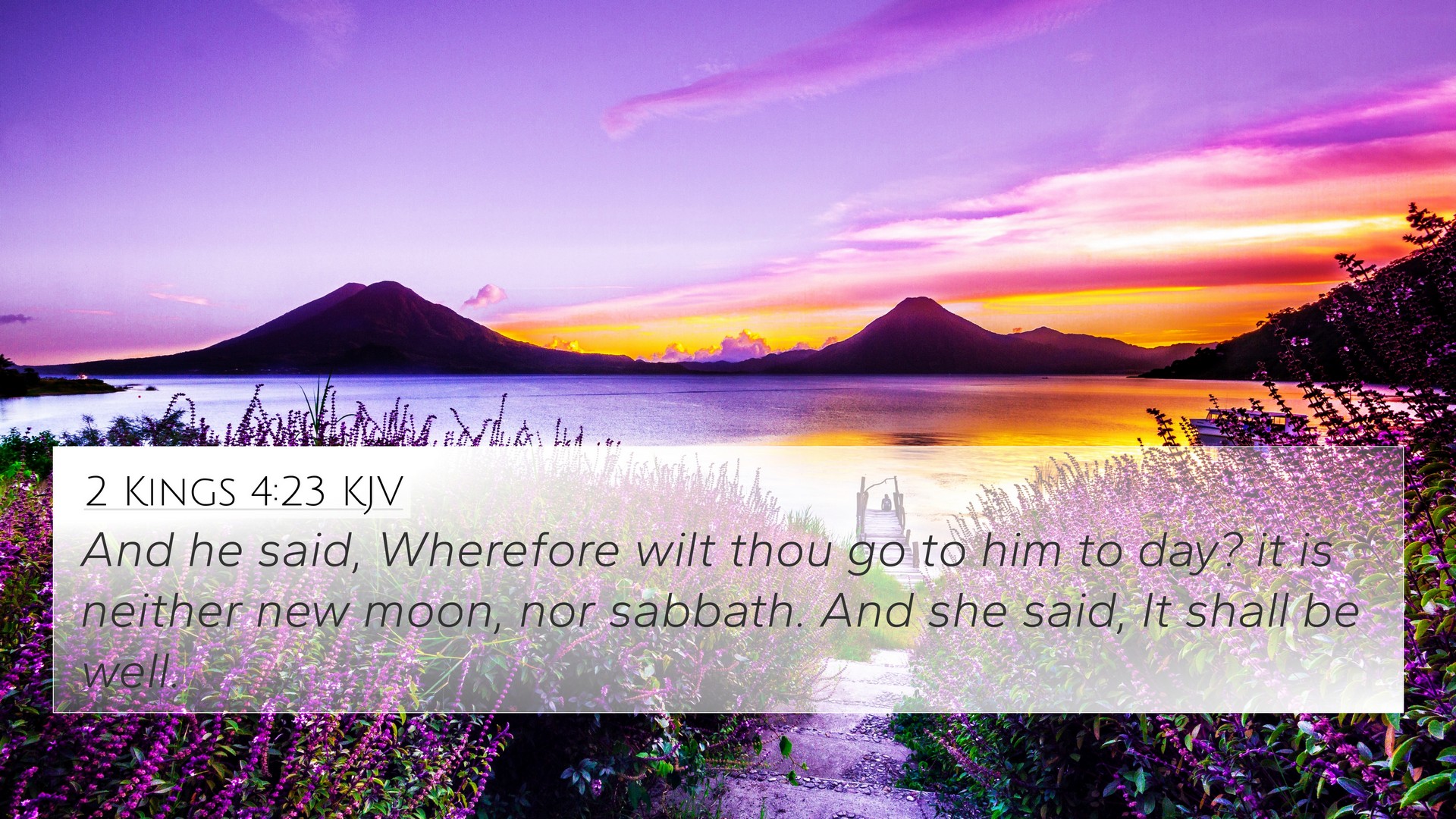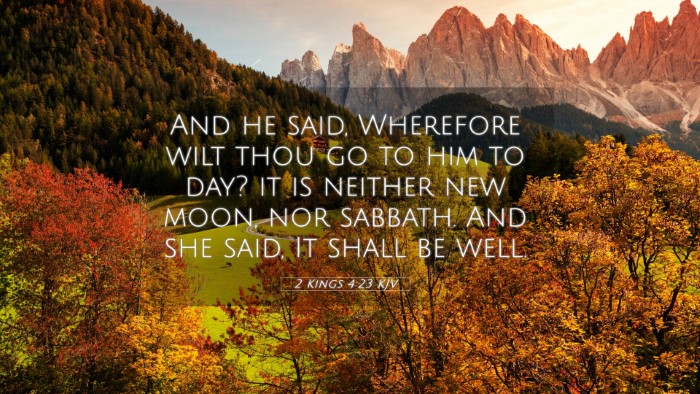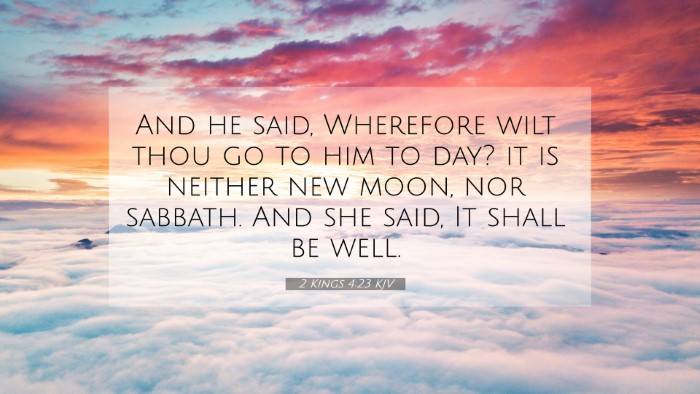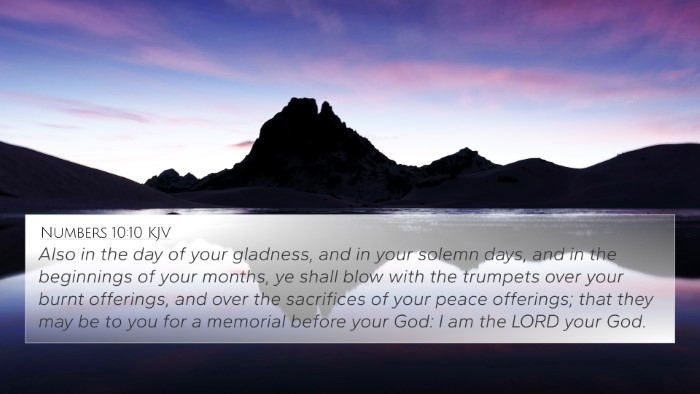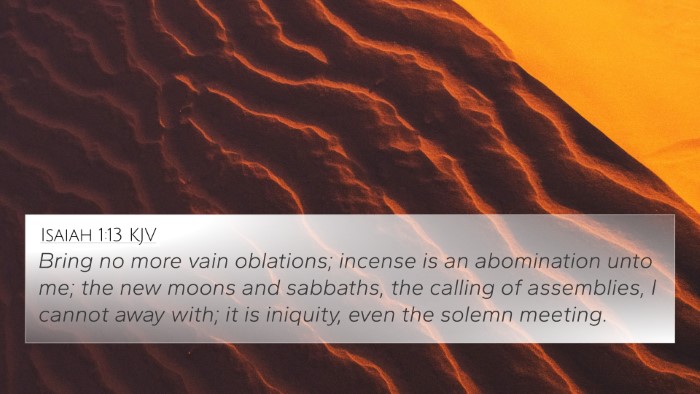Understanding 2 Kings 4:23
Verse: 2 Kings 4:23 - "And he said, Wherefore wilt thou go to him to day? it is neither new moon, nor sabbath. And she said, It shall be well."
Summary of Meaning
This verse captures a poignant moment in the narrative of Elisha and the Shunammite woman. As her son has fallen critically ill, she seeks to go to the prophet Elisha. Her husband's question reflects a common understanding of their time; the new moon and the Sabbath were traditional times for worship and seeking the prophet’s counsel. The Shunammite woman's response, "It shall be well," indicates her unwavering faith amidst distress.
Interpretation from Public Domain Commentaries
Insights from Matthew Henry
Matthew Henry emphasizes the woman's faith in her declaration that "It shall be well." Despite the dire circumstances surrounding her, her conviction suggests a profound trust in God’s providence. Henry notes that she kept her faith alive and displayed an optimistic spirit, which is pivotal in Christian faith.
Insights from Albert Barnes
Albert Barnes points out that the query from her husband indicates a lack of understanding of the urgency of her situation. He highlights how the Shunammite woman's resolve to go to Elisha demonstrates a deeper spiritual insight, signifying her belief that the prophet has the power to intercede for her son.
Insights from Adam Clarke
Adam Clarke elaborates that the woman's journey to Elisha is emblematic of the believer's voyage to seek divine assistance. Clarke articulates that her assurance, "It shall be well," reflects a strong understanding of the peace and calm that comes from trusting in God's plan, even when faced with severe tribulations.
Bible Cross-References
- 2 Kings 4:26 - Elisha's response to the woman's faith and urgency.
- 1 Kings 17:21-22 - Elijah raises the widow's son, paralleling the theme of divine intervention for the afflicted.
- Romans 8:28 - Assurance that in all things God works for the good of those who love Him corresponds with the woman’s faith.
- Hebrews 11:1 - Faith is confidence in what we hope for, linking back to the assured state of the Shunammite woman.
- Psalm 23:4 - "I will fear no evil," represents the woman’s trust in God's presence in her desperate moments.
- Mark 5:36 - Jesus instructs not to fear but to believe; akin to the woman’s resolute conviction.
- James 1:6 - Challenges of faith but the necessity to ask in faith without doubt relate to the troubles the woman faced.
Thematic Connections
This passage resonates deeply with themes of faith and divine Providence found throughout the Bible. The woman's experience illustrates the essential nature of faith (see also Hebrews 11) and the belief that God can intervene miraculously in dire situations.
Using Cross-References for Deeper Understanding
To fully grasp the implications of 2 Kings 4:23, one can utilize various tools for Bible cross-referencing. This includes:
- Utilizing a Bible concordance to search related themes.
- Employing a Bible cross-reference guide to locate similar verses.
- Exploring inter-Biblical dialogue between Old and New Testament connections.
- Referencing a comprehensive Bible cross-reference manual for sermon preparation and study.
Conclusion
In conclusion, 2 Kings 4:23 serves as a vital reminder of the power of faith and the profound assurance that trusting God can instill, even in the bleakest of times. By cross-referencing this verse with others, believers can deepen their understanding of God's character and His willingness to act on behalf of those who seek Him.
Related Keyword Themes
For those seeking to delve deeper into the connections between Bible verses, these thematic explorations can be enriching:
- Identifying connections between Old and New Testament may unveil consistent themes of faith and miraculous interventions.
- Bible verses related to hope in adversity can guide readers through times of struggle.
- Cross-referenced themes in the Bible can reveal intricate relationships between the lives of biblical figures and their faith journeys.
